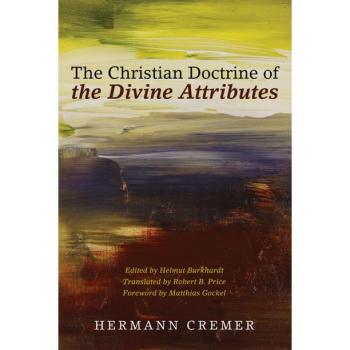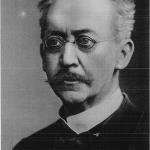Universalism Is “In the Air” (Much Discussed) Among Even Evangelicals: What About It?
Recently I’ve been reading and reviewing theologian Oliver Crisp’s new book Deviant Calvinism: Broadening Reformed Theology (Fortress, 2014) and at least a few of my blog followers have been reading it with me. I appreciate those who have posted comments about the book or responded to my critiques.
One theme that keeps coming up throughout the book is “universalism.” Chapter 6 and 7 are (respectively) “Barthian Universalism?” and “Hypothetical Universalism.” (In previous chapters Crisp has discussed so-called “Augustinian Universalism.”)
One thing is becoming undeniably clear—to anyone who reads a broad spectrum of contemporary evangelical theology: universalism is “in the air.” I mean it is being much discussed by evangelicals and not always only in negative ways. Many evangelicals are considering various options in universalism in a way that evangelicals in the past would not have done.
Crisp’s chapter on “Barthian Universalism?” is typical of most of his chapters in that he analyzes but stops short of affirming. His conclusion about Karl Barth’s own attitude toward universal salvation is intriguing. (I have weighed in on this subject here before with a rather lengthy essay about Barth’s universalism. If you have any interest in that you can google my name and key words to find that essay which I think was unjustifiably rejected by a theological journal because the one anonymous peer reviewer condemned it as saying nothing new which leads me to think he did not even read to the end of the essay!)
According to Crisp, Barth did not have a completely coherent position about the “scope of salvation.” In some places he affirmed its particularity (only some will be saved) and in other places he affirmed its universality (all are saved because all are elected to salvation in Jesus Christ). However, Crisp does not stop there as some Barth scholars have. Instead he suggests that we interpret Barth differently than if we expected from him a completely coherent, linear explanation of his own view.
Crisp helpfully (but experimentally) proposes that instead of looking for such in Barth we might try looking for “A Barthian Story of Election” that looks for the spirit of Barth’s account “setting to one side the letter of some of what Barth says but retaining the spirit of much of his stated doctrine.” (170) What happens then, according to Crisp, is that we find a story in which “all human beings are elect but may freely reject the derivatively elect status bestowed upon them [in which case they] may continue to reject Christ forever and be lost. But they may not.” (171) In other words, according to this “story” Barth’s account of the scope of salvation amounts to Hans Urs von Balthasar’s “hopeful universalism.”
I find this an intriguing but ultimately unsatisfying answer to the vexed question of Barth’s belief about the scope of salvation. It is intriguing because it forges a middle ground, a via media, between two traditional extremes of Barth interpretation. Some have claimed that Barth really was a universalist in the sense of believing that all will be saved. Brunner accused Barth of teaching a “doctrine of apokatastasis.” Other Barth interpreters have denied that Barth had such a doctrine and Barth himself emphatically denied that he taught apokatastasis. However, “apokatastasis” is generally used as the technical term for church father Origen’s (alleged) belief that even Satan would eventually be saved: “ultimate reconciliation.”
Crisp’s “story” approach comes down between these two interpretations of Barth on the scope of salvation. However, I’m not entirely satisfied with any of these interpretations—as I have expressed in my essay on Barth’s universalism. My interpretation is slightly different even from Crisp’s which is closest to it. In my rejected essay I argued that Barth’s view (using many quotes from Church Dogmatics) must have been that all are elected to salvation in Jesus Christ so that ontologically and legally all are destined for salvation (if not already saved). However, epistemologically not all will realize their salvation; some will and do reject their elect status in Christ and hell is, as C. S. Lewis urged, the “painful refuge” God provides for those who reject his love and mercy. Barth would say, I believe, that those in hell are nevertheless elect and in some sense also saved, but they are permitted by God to go away from the Father’s house into a far country like the prodigal son and remain there. Their reject of God’s election of them in Jesus Christ stands, but their realization of it is never actualized.
This, I think, is true “Barthian universalism” and I have shown that to be the case in my unjustly rejected essay. (The anonymous critic also complained about my quoting much from Church Dogmatics. Really? C’mon. How can one make a case for Barth’s view without quoting much from Barth—especially in an area as controversial as this?)
To repeat: I believe Barth’s view must have been that all people are reconciled with God through Jesus Christ from God’s side so that if they accept that reconciliation based on election they will enjoy its benefits but that God gives them the privilege of rejected that enjoyment but not of cancelling his election of them in Jesus Christ. Is this different from Crisp’s interpretation? I think so insofar as Crisp thinks that Barth’s view implies that a person can cancel God’s reconciling election and become “lost forever.”
So, the discussion of Barth’s view of the scope of salvation goes on and probably will go on forever until the end of theology when we “see face to face and know as we are known.” It’s fun, sometimes. The fun stops, however, when one or two people manage to gain the status of “popes” of Barth interpretation such that journals (for example) use them and their interpretations of Barth as touchstones of correct interpretation. Then the fun stops.
Back to the main point of this blog post as implied by its title. I think that universalism is “in the air” among evangelical theologians because of Barth. Many evangelical theologians have discovered in Barth a conversation partner they have not found in either liberal theology or conservative theology. (Of course Barth was “conservative” in some senses of the word but here I mean “neo-fundamentalism” as in the heirs of the Old Princeton School of Hodge and Warfield.) But another cause of it is C. S. Lewis who, although clearly not a universalist, clearly did believe in hypothetical universalism and potential universalism. In The Great Divorce he has one character from hell remaining in heaven! Why not eventually all? That’s the door he opens.
Of course some evangelicals have come right out and affirmed absolute universalism, not conditional or hopefully or potential universalism. This view can be found expressed and explained in The Evangelical Universalist by Robin Perry writing under the pseudonym Gregory MacDonald. I have personally talked with several well-known evangelical theologians who have told me under pain of calling me a liar if I reveal what they said that they have come to embrace absolute universalism—of Jürgen Moltmann’s type which is that hell is real but temporal and will eventually be emptied. This is still the “kiss of death” in the halls of evangelical power, so they do not want me to reveal their view.
Of course the subject of universal salvation has long cropped up among evangelicals, but in the past, at least, any evangelical theologian who even hinted at embracing absolute universalism was banished from the “camp” and automatically labeled “liberal.” Such happened, for example, to Swedish Baptist theologian Nels Ferré. Today, in my opinion, a groundswell of interest in Barthian universalism and the discovery of C. S. Lewis’s view of hell are together (with other influences) bringing universalism to a new stage among evangelicals where one can see a possible horizon in which universalism will be accepted as normal (but not normative) for evangelicals. In other words, an evangelical theologian who “comes out of the closet” as embracing absolute universalism will not automatically be excommunicated from the evangelical movement by its popes.
If this happens, however, I predict it will not be Arminians who lead the way; it will be Reformed/Calvinist evangelical theologians who bring it about. The fact of the matter is that, contrary what neo-fundamentalists would have you believe, it is Calvinism, not Arminianism, that inclines toward universalism. Schleiermacher, for example, was never an Arminian and did not believe in free will. Barth, whatever his beliefs about free will, was untouched by Arminianism (even though I find elements in his thought that are consistent with Arminianism). It’s pretty easy for a young, unmarried or not-yet-parent Young, Restless, Reformed person to embrace double predestination, but when he has a child and gazes on it as his own beloved son or daughter he beings to change (or should if his love is real and deep). Could this beloved child be predestined by God our Father to eternal torture in hell? Sure, some very iron clad Calvinists will not let that sway them, but many will. Then, unless the Calvinist converts to Arminianism, the next step, insofar as he or she holds firmly to “decretal theology” is to universalism. Universalists are Calvinists with soft hearts and a true vision of the love of God shown in Jesus Christ. Arminians are immune to universalism because we believe God’s love includes permitting the beloved to walk away and reject God’s mercy.
Note: If you choose to respond, please observe this blog’s “rules of the road” which I have posted at the end of approximately every other post for some time. I won’t repeat them here; they are common sense. I won’t post responses that are uncivil, inflammatory, off subject, etc.
















